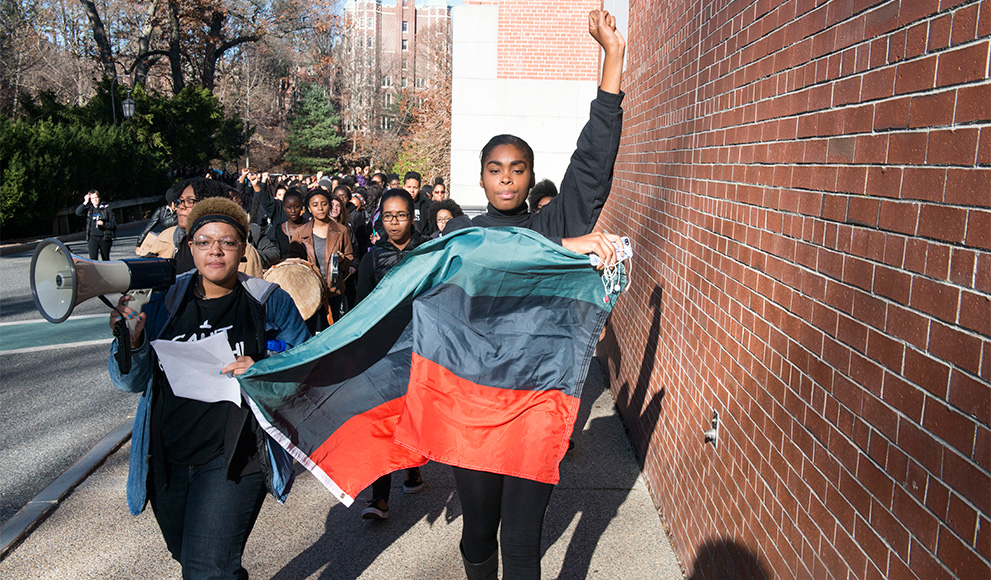Marches, Panels, and Campus Gatherings Address Racism and Social Justice

National and world problems, not always seen as part of day-to-day life here, reverberated across campus yesterday—in profound, meaningful, and sometimes uncomfortable ways. Wellesley joined schools across the region and the country where students are insisting that issues of systemic racism in our broader society also be addressed at home, on our own campuses. The campus community both acknowledged a difficult racial reality we face together but also did its best to listen, reflect and respond. Across a wide swath of campus, students, faculty, and administrators took part in events that addressed systemic inequalities close to home as well as terrorism far away.
An early afternoon march was led by a large group of students frustrated by a racial climate on campus they insist needs to change. Chanting as they walked, the marchers began at the Lulu Chow Wang Campus Center and wended their way to the Academic Council Room in Green Hall. All dressed in black as a symbol of solidarity, the group made their voices heard during a meeting with administration. The students shared—with frustration, passion and determination—their personal experiences of exclusion and marginalization and demanded change. College leaders were on hand to meet the students, to listen to their experiences, and to pledge progress, including plans to provide unconscious bias training that focuses on racial equity and inclusion, something student demonstrators stressed was critically needed for the campus at large.
Meanwhile, an example of such efforts took place across campus in the Diana Chapman Walsh Alumnae Hall ballroom. The Provost’s Office and The Partnerships for Diversity & Inclusion team at Wellesley hosted one of its “Actualizing Equity” learning series. A conversation with racial educator Debby Irving, the talk was entitled “I'm a Good Person! Isn't That Enough?" Irving, the author of Waking Up White, spoke about growing up in a “white bubble” and being “exquisitely trained” to accept the social narratives that hide the fact that “some people are more valued in this country than others.’’ It’s important to understand, she added, that “my advantage is absolutely connected to [others’] disadvantages.” She ended the talk by acknowledging that even her presence as a white person speaking about racism is proof that more work needs to be done. She explained, “I think it’s a lot more comfortable for white people to hear [about race] from a speaker who looks like me [and that’s part of the struggle].” Near the end of the presentation, Irving asked the audience to speak candidly about their feelings, and a question and answer session ended the talk, revealing those in attendance were struggling with questions about race and racism."
Events like this are working in tandem with the Presidential Commission on Ethnicity, Race, and Equity (CERE), which is determined to find solutions to the problems students face and to strive with vigor and commitment to create a more inclusive campus for everyone.
Though they may seem a world away, recent terrorist attacks prompted the campus community to come together for another special event, a vigil that was held just after noon. Organized by Slater International Center’s executive board and the Office of Spiritual and Religious Life, "Together as One: A Community Gathering in Global Solidarity” took place in the Multifaith Gathering Space in Houghton Chapel. Students, staff, and faculty held a candle lighting as they met to share student reflections and poetry. Student and staff speakers spoke about the need for all of us to support each other at these times and underscored the importance of decrying violence across the globe and not only in Western countries.
